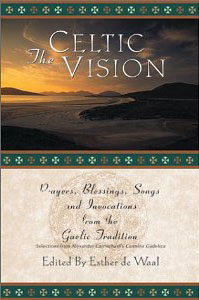Book Notes
 Esther de Waal, editor, The Celtic Vision; Prayers, Blessings, Songs and Incantations from the Gaelic Tradition (Liguori, MO: Liguori Publications, 2001), 171pp.
Esther de Waal, editor, The Celtic Vision; Prayers, Blessings, Songs and Incantations from the Gaelic Tradition (Liguori, MO: Liguori Publications, 2001), 171pp.
This book has a distinct history that's not apparent from its title, although it's made clear in de Waal's introduction.
For sixty years the folklorist Alexander Carmichael (1832–1912) traversed Scotland's Outer Hebrides isles collecting and translating the traditions of its Gaelic-Catholic people. If you look at a map of the Hebrides's 130-mile craggy coast, you can imagine the passion and physical stamina that must have required.
Carmichael's eventual trove contained a little of everything — their ballads, prayers, proverbs, hymns, charms, incantations, runes, poems, tales and songs. All of which constituted an ethnography, oral history and preservation of an indigenous culture. Professor Ronald Black of Edinburgh University says, "Carmina Gadelica is by any standards a treasure house… a marvellous and unrepeatable achievement. There will never be another Carmina Gadelica."
Carmichael's labor of love was published in six volumes across seventy years as Carmina Gadelica ("Hymns of the Gael"): Hymns and Incantations, With Illustrative Notes on Words, Rites, and Customs, Dying and Obsolete: Orally Collected in the Highlands and Islands of Scotland. Carmichael published the first two volumes in 1900. His daughter Ella continued the project. Volumes 3 and 4 were published by his grandson, James Watson, in 1940–1941. Volumes 5 and 6 were published by Angus Matheson in 1954 and 1971.
Much of the Carmina Gadelica is a distinctly Christian form of Celtic spirituality. Some of it's a syncretism of the superstitious and pagan. All of it's a lyrical combination of the simple and yet dignified, homely and eloquent, ordinary and yet sacred. If you google "Carmina Gadelica" you'll find an online version. Even better is Esther de Waal's book, a collection of excerpts which she has organized into sixteen different categories. It includes poetry about birth and death, prayers for morning and evening, healing and protection, invocations to bless the land, the hunting and herding, the farming and fishing.
I especially like the "invocations and good wishes" and "short blessings" in de Waal's book. Here's one of my favorites.
The love and affection of heaven be to you,
The love and affection of the saints be to you,
The love and affection of the angels be to you,
The love and affection of the sun be to you,
The love and affection of the moon be to you,
Each day and night of your lives,
To keep you from haters, to keep you from harmers,
To keep you from oppressors.
These simple words are a sacred act. They're both tender and profound. When we bless another person, we're not wishing them good luck, as if they had sneezed. Rather, in the words of another Celtic blessing, we're commending them to a Father who wants "to do excelling good to me." I have enjoyed using de Waal's book in my times of prayer and devotion, and highly recommend it.


